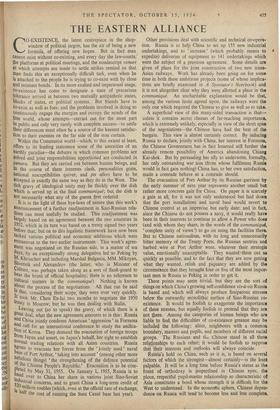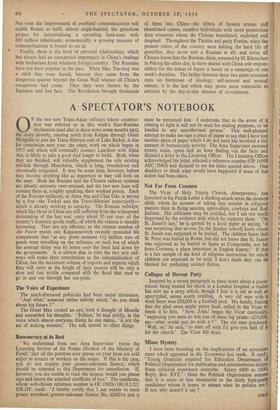THE EASTERN ALLIANCE
CO-EXISTENCE, the latest centrepiece in the shop- window of political jargon, has the air of being a new formula, of offering new hopes. But in fact man cannot exist without co-existing, and every day the law-courts, the platforms at political meetings, and the nondescript venues lit which attempts are made to settle strikes remind us that Elan finds this an exceptionally difficult task, even when he is attached to the people he is trying to co-exist with by close and intimate bonds. In its more exalted and impersonal usage, CO-existence has come to designate a state of precarious tolerance arrived at between two mutually antipathetic states, blocks of states, or political systems. But friends have to 6o-exist as well as foes; and the problems involved in doing so continuously engage the energies and occupy the minds of the IT:e world, whose attempts—carried out for the most part public and only very rarely with complete success—to settle their differences must often be a source of the keenest satisfac- tion to their enemies on the far side of the iron curtain.
Within the Communist world—which, to this extent at least, Offers to its leading statesmen some of the amenities of an t,arthly paradise—the debates in which common problems are folved and joint responsibilities apportioned are conducted, in camera. But they are carried out between human beings, and in the course of them interests clash, personalities grate, national susceptibilities quiver, and pis allers have to be accepted in exactly the same way as they do in the West. The fich gravy of ideological unity may lie thickly over the dish Which is served up in the final communiqué; but the dish is not necessarily what any of the guests first ordered. It is in the light of these bye-laws of nature that this week's announcement of a further readjustment in Sino-Russian rela- tions can most usefully be studied. This readjustment was largely based on an agreement between the two countries in before which in its turn was based on a treaty signed two years oefore that; but on to this legalistic framework have now been tacked various political and economic additions which were extraneous to the two earlier instruments. This week's agree- ment was negotiated on the Russian side, in a matter of ten days,, by an exceptionally strong delegation led to Peking by '1. Khruschev and including Marshal Bulganin, MM. Mikoyan, Shvernik and Alexandrov (the latter, who is Minister of Nlture, was perhaps taken along as a sort of flank-guard to bear the brunt of official hospitality; there is no reference to Cultural matters in the communique'). Nothing is known .ahout the process of the negotiations. All that can be said la that, considering their scope, they were over very quickly. It took Mr. Chou En-lai two months to negotiate the 1950 treaty in Moscow; but he was then dealing with Stalin. Leaving out (so to speak) the gravy, of which there is a great deal, what the new agreement amounts to is this: Russia and China jointly condemn American ' aggression' in Formosa and call for an international conference 10 study the unifica- tion of Korea. They demand the evacuation of foreign troops from Japan and assert, on Japan's behalf, her right to establish ,normal trading relations with all Asian countries. Russia !t_grees to evacuate her forces from the ' jointly used' naval Nebulous of Port Arthur, ' taking into account' (among other more u!bulou s things) `the strengthening of the defence potential of the Chinese People's Republic' Evacuation is to be com- pleted by May 31, 1955. On January 1., 1955, Russia is to ?Lad over to China her share in various joint Sino-Soviet 520ustr.ial concerns, and to grant China a long-term credit of L , ms 'Rion roubles (which, even at the official rate of exchange, '4 half the cost of running the Suez Canal base last year). Other provisions deal with scientific and technical co-opera- tion. Russia is to help China to set up 155 new industrial undertakings, and to increase' (which probably means to expedite) deliveries of equipment to 141 undertakings which were the subject of a previous agreement. Some details are given of plans for the joint construction of two new trans- Asian railways. Work has already been going on for some time in both these ambitious projects (some of whose implica- tions are briefly examined in A Spectator's Notebook) and it is not altogether clear why they were allotted a place in the communiqué. An uncharitable explanation would be that, among the various items agreed upon, the railways were the only one which required the Chinese to give as well as to take.
A superficial view of this many-sided transaction is that— unless it contains secret clauses of far-reaching importance, which is extremely unlikely, especially in view of, the short span of the negotiations—the Chinese have had the best of the bargain. This view is almost certainly correct. By inducing Russia to declare, jointly with China, her interest in Formosa, the Chinese Government has in fact lessened still further the already remote possibility of America abandoning Chiang Kai-shek. But by persuading her ally to underwrite, formally, her only outstanding war aim (from whose fulfilment Russia would in fact gain nothing) China has, to her own satisfaction, made a comrade behave as a comrade should.
The evacuation of Port Arthur by its Russian garrison by the early summer of next year represents another small but rather more concrete gain for China. On paper it is scarcely a gain at all, for it was not only understood but laid down that the port installations and naval base would revert to Chinese control at an imprecise but early date; and in fact, since the Chinese do not possess a navy, it would really have been in their interests to continue to allow a Power who does (and with whom they share, in the words of the communiqué, `complete unity of views ') to go on using the facilities there. But to Chinese nationalism, with its long and unnecessarily bitter memory of the Treaty Ports, the Russian sentries and barbed wire at Port Arthur were, whatever their strategic value, emotionally unacceptable. They wanted.them out as quickly as possible; and to the fact that they are now getting what they wanted, relish and piquancy are added by the circumstance that they brought four or five of the most impor, tant men in Russia to Peking in order to get it.
These points may seem trivial, but they are the sort of things on which China's growing self-confidence vis-a-vis Russia is based and which will always produce fissiparous stresses below the outwardly monolithic surface of Sino-Russian co. existence. It would be foolish to exaggerate the importance of these stresses, but equally foolish to pretend that they are not there. Among the categories of human beings who are liable to find, the difficulties of co-existence greatest may be included the following: allies, neighbours with a common boundary, masters and pupils, and members of different racial groups. The Russians and flit; Chinese stand in all these relationships to each other; it would be foolish to suppose that their interests and outlooks will always coincide.
Russia's hold on China, such as it is, is based on several factors of which the strongest—almost certainly—is the least palpable, It will be a long time before Russia's status as the fount of orthodoxy is jeopardised in Chinese eyes; the pious, respectful pupil-master relationship so characteristic of Asia constitutes a bond whose strength it is difficult for the West to understand. In the econontic sphere, Chinese depen- dence on Russia will tend to become less and less complete. Not even the improvement of overland communications will enable Russia to fulfil, almost single-handed, the grandiose project for industrialising a sprawling land-mass with 600 million inhabitants; economically, a growing measure of cosmopolitanism is bound to set in. • Finally, there is the level of personal relationships, which has always had an unexpected importance in China's dealings with barbarians from whatever foreign country. The Russians have not been popular in the past. When Mao Tse-tung was a child they were feared, because they came from the dangerous quarter beyond the Great Wall whence all China's conquerors had come. Then they were beaten by the Japanese and lost face. The Revolution .brought thousands of them into China—the debris of broken armies and abandoned causes, stateless individuals with more pretensions than resources whom the Chinese humiliated, exploited and despised. Throughout the Thirties and early Forties, when the present rulers of the country were leading the hard life of guerrillas, they never saw a Russian at all; and today all Chinese know that the Russian claim, repeated by M. Khruschev, in Peking the other day, to have shared with China sole respon• sibility for the defeat of Japan is based on a campaign of one week's duration. The bridge between these two great countries rests on buttresses of ideology, self-interest and mutual esteem; it is the last which may prove most vulnerable to attrition by the day-to-day stresses of co-existence.



































 Previous page
Previous page